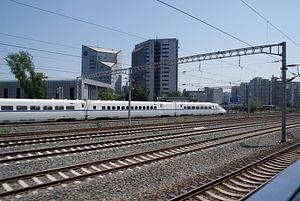China and Thailand have agreed on the cost of the first phase of a planned high-speed railway project, thereby once again breathing new life into Beijing’s grand infrastructure ambitions in Southeast Asia, Thailand’s transport minister said Wednesday.
The two countries have been discussing the billion-dollar rail project for years, with the latest iteration since 2014 being two routes covering 873 kilometers (542 miles) running from southern China through Laos to Thailand’s industrial eastern coast. As I have stressed elsewhere, the project is central to Chinese broader infrastructure objectives under the One Belt, One Road which would see a railway running from Kunming all the way down to Malaysia and Singapore (See: “China’s Grand Plans in Southeast Asia on Track With Thai Rail Deal”).
Yet negotiations between the two countries on the rail project have been going on in fits and starts due to disagreements on various issues including costs.
The latest agreement, where they agreed to construct the first 3.5 kilometer section of the railway from Bangkok to Pak Chong – part of the 271.5 kilometer southern stretch from Bangkok to Nakhon Ratchasima – had been derailed because of financial issues, with China estimating in May that the costs of that stretch be 200 billion baht and Thailand projecting 180 billion.
The Bangkok-Nakhon Ratchasima section is one of three in the rail project where construction would start, with the others being a 355-kilometer section from Nakhon Ratchasima to Nong Khai province bordering Laos and a 246.5 kilometer section from Saraburi province to Rayong province which would be worked on later.
Over the past week or so, things seemed to have been smoothed over for the time being. Last week, Deputy Prime Minister Prajin Juntong announced that the two countries had agreed to proceed with the first phase on the sidelines of the 13th China-ASEAN Expo in Nanning, with construction expected to begin in the second quarter of 2017.
On Wednesday, Thai Transport Minister Arkhom Termpittayapaisith told reporters in Bangkok after a three-day meeting with Chinese officials that the two sides had agreed to a price tag of 179 billion baht.
“This project will cost 179 billion baht. This is what we agreed upon,” Arkhom said according to Reuters.
Arkhom added that Thailand would bear the full costs of construction, while China would provide funds for technical systems.
That said, several things still need to be ironed out before construction can begin. According to The Bangkok Post, Prajin had emphasized that details for the Thai working committee’s terms of reference are expected to be completed by the end of the year or early next year. He also added that some issues needed to be clarified including soil conditions, the control system, and the project’s impact on people’s livelihoods and the environment.
































